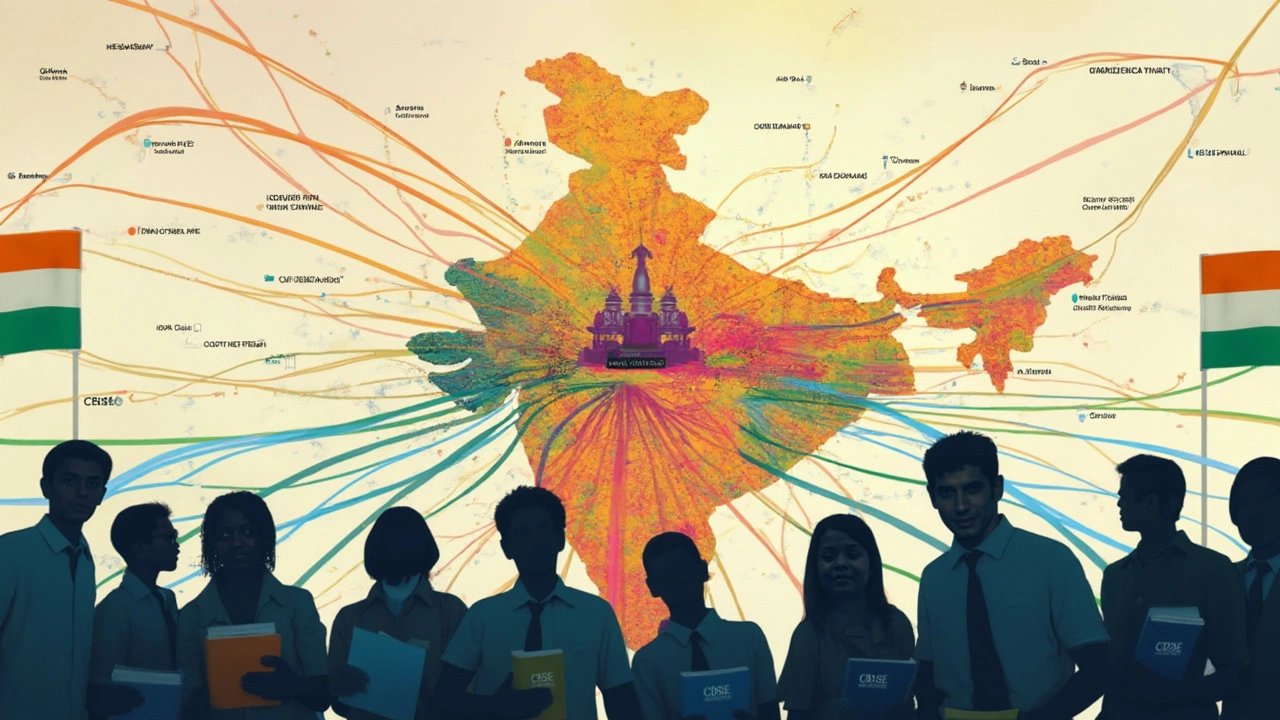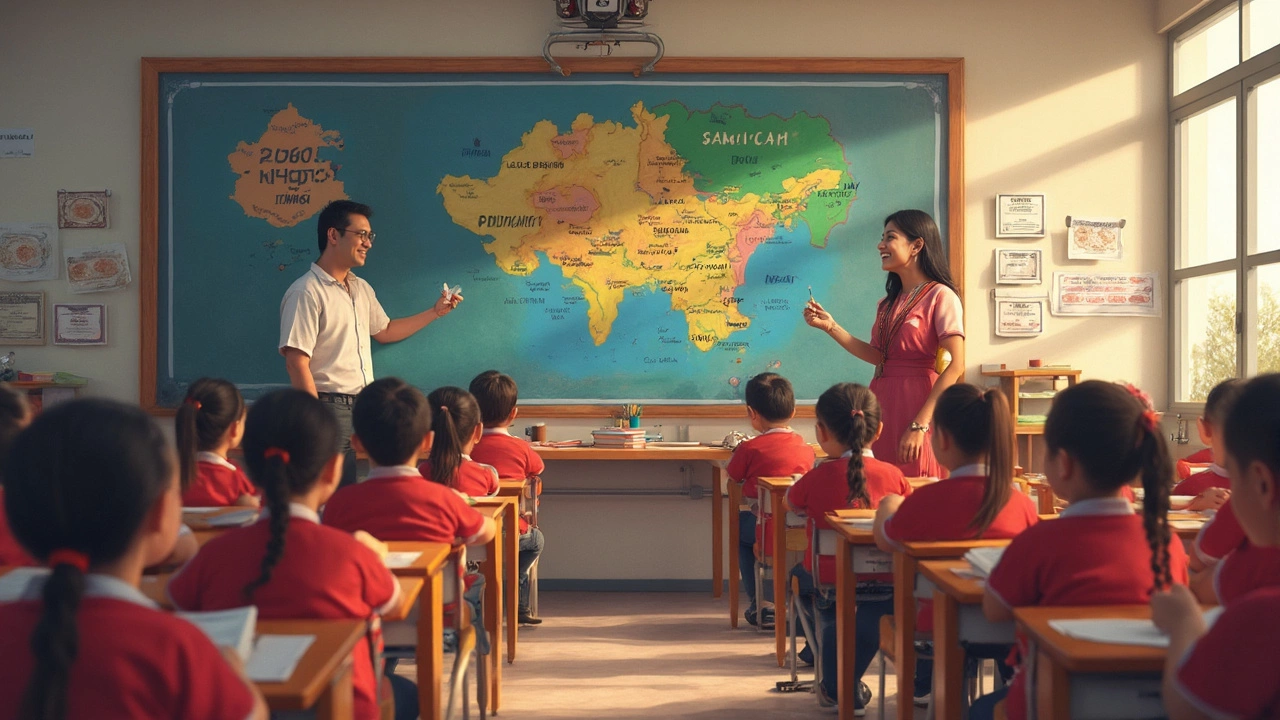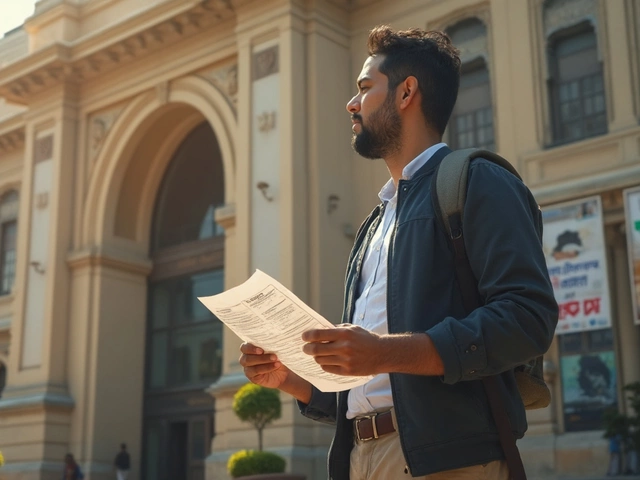Ever heard someone call CBSE the 'Delhi board'? You're not the only one. Tons of folks mix this up or assume CBSE only matters in Delhi. But that’s just not how it works. Sure, the main CBSE office sits in Delhi, but CBSE isn’t a state board tied to Delhi like, say, the Maharashtra or Tamil Nadu boards are to their own states.
CBSE stands for Central Board of Secondary Education. That word 'central' matters a lot. It’s run by the national government, not by Delhi’s local leaders. Schools from Kerala to Kashmir—plus many in the UAE, Singapore, and more—teach using the CBSE syllabus. Delhi’s just where the head office is, not where the rules end.
If your school says it’s CBSE affiliated, your textbooks, exams, and even your timetable probably line up with CBSE standards no matter which state (or country) you're in. That’s why understanding the real reach of CBSE helps you see what you’re actually signing up for—and why it’s one of the most popular boards in India and beyond.
- What Is CBSE—and Why Is It Linked to Delhi?
- How CBSE Differs from State Boards
- CBSE Syllabus: Who Sets It and How It Spreads
- Does the CBSE Headquarters Location Matter?
What Is CBSE—and Why Is It Linked to Delhi?
So, what’s the real story with CBSE and Delhi? For starters, CBSE stands for Central Board of Secondary Education. This board started back in 1929, way before independence, when the government wanted a common standard for kids moving between states. At the time, Delhi had a lot of government schools (think military families and central government jobs), so it made sense to center things there.
Today, CBSE controls and oversees secondary and senior secondary education for almost 30,000 schools—most of them not even in Delhi. Its headquarters happen to be in Delhi, but that just makes it easier for the central offices to connect with the Ministry of Education and other government departments. The board itself isn’t run by the Delhi state government, but by the Government of India.
If you’re still curious about the numbers, check out this quick comparison below:
| CBSE Fact | Detail |
|---|---|
| Founded | 1929 |
| Headquarters | Delhi (Preet Vihar, currently) |
| Total Schools (2024) | ~29,800 |
| Schools in Delhi | About 2,000 |
| CBSE Abroad | 240+ schools in 28 countries |
This clears up the confusion: just because CBSE's main office sits in Delhi doesn’t mean it’s Delhi’s own board. It simply runs its operations from the capital, like how Apple is based in California but sells iPhones everywhere.
The only real “Delhi board” is the Delhi Board of School Education (DBSE), which mainly covers city-run schools. CBSE’s rules and syllabus, meanwhile, shape education all across India and even outside the country. So next time you hear someone mix up the two, you can set the record straight.
How CBSE Differs from State Boards
The biggest thing that sets CBSE apart from state boards is that CBSE is national. State boards, like the Rajasthan Board or CBSE’s neighbor, the Delhi Board of School Education, work within just one state’s boundaries and make their own syllabus, exams, and rules. CBSE, meanwhile, is managed by the central government and its rules stay the same across India (and even in some other countries).
One key thing parents and students care about: the CBSE syllabus stays pretty much the same for every school that’s CBSE-affiliated, wherever you live. But state board textbooks and subject choices sometimes change from place to place—even within the same state. If you move from one state to another, switching from a state board to CBSE can mean less hassle with study material changes.
- Curriculum: CBSE follows a standard curriculum based on the National Council of Educational Research and Training (NCERT). State boards often write their own books, sometimes in different languages.
- Exams: CBSE conducts all the big exams like Class 10 and 12 Board Exams on fixed dates, with the same paper for every CBSE student in India. State boards use their own schedules and different question papers, even for similar subjects.
- Recognition: CBSE certificates and marksheets are recognized all over India for getting into colleges, applying for entrance tests, and even for jobs in central organizations. State board marksheets are usually accepted in their own state, but might not be valued the same everywhere else.
- Medium of Study: CBSE mostly uses English or Hindi. State boards offer more local language options but sometimes limit outside state recognition.
Check out this quick comparison to see how it plays out:
| Feature | CBSE | State Boards |
|---|---|---|
| Authority | Central Government (India-wide) | State Government (One state) |
| Curriculum | NCERT, same everywhere | Varies by state |
| Language Medium | Mainly English/Hindi | Local languages common |
| Recognition | National & international | Mostly state-level |
| No. of Affiliated Schools | Approx. 28,500 (as of 2024 data) | Each state has its own count |
| Major Exams | All-India exams (Class 10 & 12) | State-level exams |
The upshot: CBSE aims for consistency anywhere you go, while state boards let each region customize things more. If you're planning on competitive exams or moving cities, sticking with CBSE usually makes things a lot smoother.

CBSE Syllabus: Who Sets It and How It Spreads
So, who actually sits down and decides what every CBSE student should learn? That job falls to the National Council of Educational Research and Training (NCERT). They create the books and outline the yearly syllabus based on guidelines from both educational experts and the Ministry of Education. The CBSE then uses these NCERT-approved books and blueprints for setting question papers, running exams, and making sure schools stick to the plan.
CBSE doesn’t allow just any school to join the club—there’s a strict affiliation process. Schools have to meet things like having good infrastructure, certified teachers, and following safety norms. Once in, they're expected to run classes and assessments using the CBSE-approved methods, no matter whether they're located in Mumbai or Muscat.
Here’s what really makes CBSE stand out: it’s everywhere. As of April 2024, over 27,000 schools in India and nearly 250 abroad follow the CBSE curriculum. This wide reach isn't just for show—it means students moving between states, or even countries, can transition without the hassle of totally different courses or testing patterns.
| Year | CBSE Schools in India | CBSE Schools Abroad |
|---|---|---|
| 2015 | 17,300 | 200 |
| 2020 | 23,000 | 230 |
| 2024 | 27,000+ | 250 |
Don’t forget, CBSE also updates its syllabus pretty regularly to match what’s going on in science, technology, and even mental health or environmental studies. You’re not stuck with out-of-date stuff. Whenever there’s a big change, it’s announced on the CBSE website and schools get clear instructions on how to roll it out.
Bottom line: if you’re in a CBSE school, you’re learning from a syllabus shaped by India’s top education experts, meant for a national and international audience, and designed to make moving between schools as easy as possible.
Does the CBSE Headquarters Location Matter?
Let’s get this straight: just because the CBSE headquarters is in Delhi doesn’t make it a Delhi-only board. The truth is, the location of the main office is more about managing things centrally than limiting who can follow CBSE rules. The address says Delhi, but the reach spreads all over India and even to a bunch of other countries.
CBSE runs under the control of India’s Ministry of Education, which means decisions about curriculum, exams, and the syllabus come from the top—not from any city or state leadership. The Delhi office mainly handles admin work, planning, and coordination. Stuff like:
- Setting board exam schedules and centers for the whole country
- Updating and rolling out syllabus changes
- Granting affiliation to new schools after they meet specific rules
- Sorting student queries and resolving complaints (from anywhere!)
There are also regional CBSE offices in other cities like Ajmer, Guwahati, and Chennai. These branch offices deal with local-school needs, so schools never need to rely just on Delhi for quick support. This setup helps the board manage millions of students and thousands of schools without getting bogged down by location.
If you’re in Hyderabad or even an Indian school in Dubai, the fact that the CBSE headquarters sits in Delhi doesn't change how your syllabus looks or how your exams are conducted. What matters is the board’s authority and the standardized curriculum. That’s why the “Delhi board” tag just doesn’t fit.





Write a comment